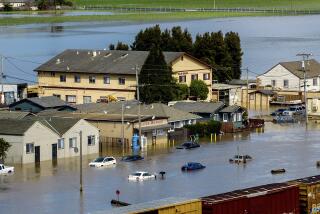River Towns Suffer as Closed Bridges Sever Vital Links : Transportation: Life for many in the region grinds to a halt. ‘We have been basically cut in half,’ says Hannibal’s mayor.
- Share via
HANNIBAL, Mo. — The sun had still not risen Monday when Glenn Ruhl arrived in the family van at a tiny airport on the outskirts of this Mississippi River town.
Coffee cup in hand, Ruhl watched a 6-seat private plane swoosh down on the runway, unload its passengers, and head back across the bulging river. The plane returned 45 minutes later, and so did Ruhl.
“I need these guys at work,” said Ruhl, manager of Manchester Tank & Equipment Co. “So today I am the shuttle bus driver.”
At a cost of $300 a day and some early morning shut-eye, Ruhl had 10 employees at his industrial manufacturing company flown to and from work Monday. The workers all live several miles across the river in Illinois, a veritable world away since Friday night when the bridge at nearby West Quincy closed after a spectacular levee break.
The loss of the Bayview--which connected West Quincy with Quincy, Ill., the economic hub and largest town in the area--was the final and most devastating blow to the remote river towns stretching north of St. Louis in Missouri and Illinois. It was the fifth bridge to close this month, leaving residents here with no reliable cross-river link for nearly 100 miles to the south, although a small bridge was reopened 35 miles north at Keokuk, Iowa, Monday.
“Unfortunately, this disaster after disaster could go on for months,” said Hannibal Mayor Richard Schwartz. “Areas on both sides of the river are so intertwined, we have been basically cut in half.”
Most people managed to get by over the weekend, but it wasn’t always easy. Relatives of one newlywed couple in Missouri drove nearly 400 miles to pick up a cake in Illinois for the wedding, which was further complicated when flooding forced the ceremony to higher ground at the last moment.
But the biggest adjustment came Monday, when commuters faced their first work day without the Bayview. Life for many ground to a halt. College students couldn’t make it to classes, supplies of groceries and other goods were delayed or canceled and some employers were left without a full roster of workers.
David Strosaker, who owns a doughnut shop in Quincy, gave up on making any deliveries to Hannibal, where this time last year he sold 70 dozen doughnuts a day to motels and convenience stores--nearly one-third of his business.
“Even if I could get over there, what good would it do?” Strosaker said.”It is like a ghost town over there.”
Tourism in Hannibal, Mark Twain’s boyhood home, has been off 75% since flooding began three weeks ago. With one in five visitors coming to town by way of the bridge at West Quincy, the lowest point was reached Monday, merchants said.
“Mark Twain is quite a drawing card, but not even he can help when you can’t drive north or east from here,” said John Hark, the city’s emergency coordinator.
In a small farming town near Hannibal, Anna Hoerr, nine months pregnant, was so worried about getting stranded that she carried her medical records in her purse. Hoerr’s doctor and hospital are across the river in Illinois.
Hoerr was on the phone Monday to Blessing Hospital in Quincy making arrangements for a helicopter to pick her up in a church parking lot on the Missouri side of the river. The hospital has set up a helicopter shuttle service for nurses living in Missouri, and has also transported a teen-ager with appendicitis, an elderly heart patient, a car accident victim and a young woman who phoned to say, “I think my water’s broken.”
“I have to admit I am a little nervous about it,” said Hoerr, 28, whose three small children were delivered in Quincy. “The thought has gone through my mind, ‘Who is flying this thing?’ But it is not every hospital that would go through this trouble. That is very special.”
More to Read
Sign up for Essential California
The most important California stories and recommendations in your inbox every morning.
You may occasionally receive promotional content from the Los Angeles Times.












